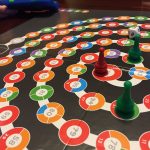Gaming is the use of games to encourage strategic mathematical thinking as students search for different strategies for solving problems. Gaming can help students deepen their understanding of numbers, develop their procedural fluency, provide opportunities to practise learned skills, all in addition to learning how to collaborate and communicate with their peers. We will use traditional strategic board games and games that promote procedural fluency, as well as Breakout EDU to enhance student learning. Breakout EDU is an immersive gaming platform whereby students collaborate and communicate to creatively solve a series of challenging puzzles and/or problems in order to open a locked box. Through this grant, teachers will be given a Breakout EDU Box and several strategy games, and be given release time to have opportunities to purposefully and collaboratively plan games that target the curricular demands of their grade. The gaming situations will increase engagement in the math tasks, and will allow opportunities for all students to contribute in ways they may have not experienced before. The incorporation of the 21st century competency skills will bolster the richness of these math tasks and provide authentic ways for students to work at developing these skills.
Team Members
Angie Miller
Renfrew County District School Board
Ian Covell
Renfrew County District School Board
Alison Broome
Renfrew County District School Board
Amy Boudreau
Renfrew County District School Board
Professional Learning Goals
Through this project, we were able to build our capacity as elementary math teachers in fostering collaboration and communication among our students through the use of board games. We were also able to use the games during guided math in order to offer precise, personalized learning opportunities for all students. We co-planned and co-created learning experiences for our students around the board games and the Breakout EDU Box.
Activities and Resources
To start, we created and administered a Student Math Interest Survey. We also used the New Pedagogies for Deep Learning progression ratings to rate our students in the areas of communication and collaboration (students also self-assessed). This survey and these ratings served as a baseline assessment for our project.
We then used the games we purchased (board games, dice and card games, Breakout EDU) to develop learning opportunities for our students. We planned guided math activities and used the games as one of our centres while we were working precisely with small groups of students.
As a team, we used pre-made Breakout EDU games to develop the collaboration and communication skills of our students. We also worked together to create our own game, giving us a chance to see how the puzzles work together and how we can tailor them to the curriculum we’re working to uncover.
Unexpected Challenges
We were surprised that although we, as educators, could see the mathematical and social value in students engaging in the games, students struggled to see the math in some of the games. They had a hard time seeing the Process Expectations from the curriculum (reasoning, proving, critical thinking, etc.) in the game experiences.
Enhancing Student Learning and Development
Having the opportunity to incorporate board games and other math games (dice, dominoes, cards) into our program fit in nicely with our School Improvement Plan of using small, flexible groups at the Junior level to increase critical thinking and collaboration. Students developed their procedural fluency with many of the dice, card and domino games. The games became a springboard for practising collaborative talk and using mathematical thinking strategies beyond word and number problems. Students had the opportunity to work with different students, in a variety of game situations. Depending on the game, they used their collaboration skills to strategize, plan and re-evaluate their results. They encouraged one another and learned from one another. As the games became more familiar, students observed and built on the strategies that allowed them to be more successful.
Sharing
We plan to share our project with our school staff at our final staff meeting of the year, and also hope to share this professional learning with our school board’s Curriculum Program Coordinator. We have also shared some of the photos from our inquiries on our school Twitter feed.
Project Evaluation
We thoroughly enjoyed our time together as a team, as well as the time we have spent playing the board games with students. The collaboration in our classrooms has certainly improved as a result and students were asking for the games for Christmas and birthdays. It was rewarding to see them enjoy thinking and so exciting to see perseverance pay off in a winning strategy or move. Student engagement in this project was always high. Students are better able to articulate their thinking to each other, as well as reflect on their own thoughts to understand personal strengths and weaknesses.
The games and other resources provided by the project have now become an important part of our classroom math activities. Incorporating gaming into the classroom has also encouraged us to really think about delivering a smooth and well-organized unit plan; such that we are always cognizant of time and best use of resources. The games that we now choose are specific and purposeful.
The time made available to staff to collaborate, learn and analyze the impact of using games in our classroom was valuable and informative professional development. This is truly a “winning” combination for success of our collaboration project.
Resources Used
Domino, Dice and Card Games: https://www.boxcarsandoneeyedjacks.com/
Board Games: Checkers, Mancala, Mastermind, Sequence, Blokus, Gobblet!, Prime Climb, Qwirkle
Resources Created
These resources will open in your browser in a new tab, or be downloaded to your computer.



